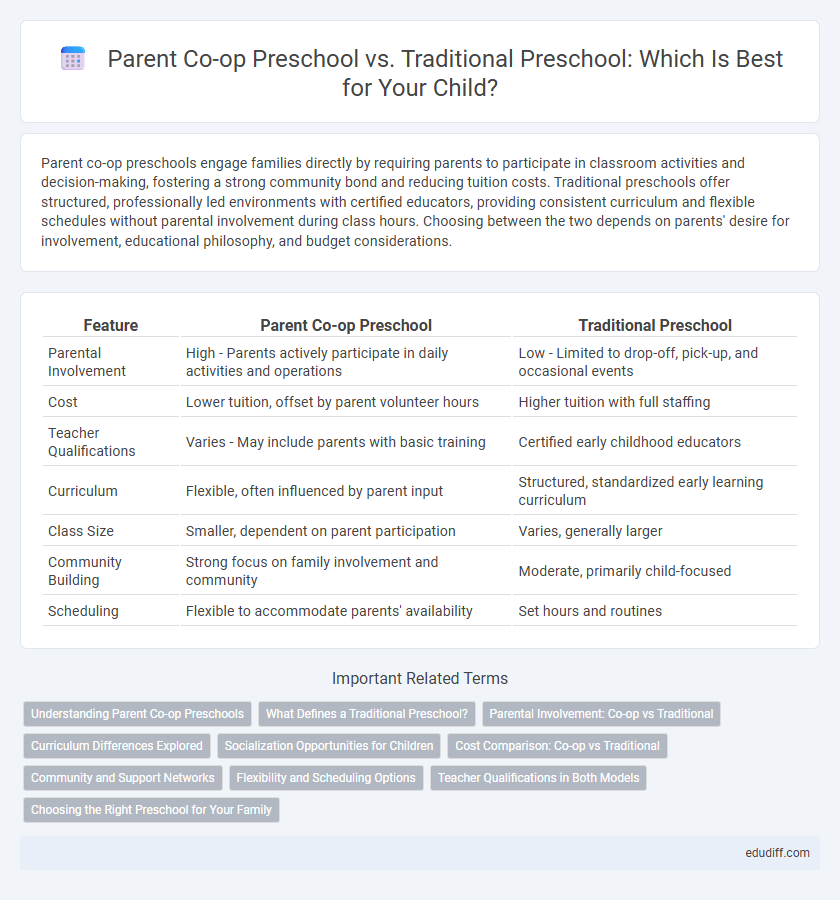Parent co-op preschools engage families directly by requiring parents to participate in classroom activities and decision-making, fostering a strong community bond and reducing tuition costs. Traditional preschools offer structured, professionally led environments with certified educators, providing consistent curriculum and flexible schedules without parental involvement during class hours. Choosing between the two depends on parents' desire for involvement, educational philosophy, and budget considerations.
Table of Comparison
| Feature | Parent Co-op Preschool | Traditional Preschool |
|---|---|---|
| Parental Involvement | High - Parents actively participate in daily activities and operations | Low - Limited to drop-off, pick-up, and occasional events |
| Cost | Lower tuition, offset by parent volunteer hours | Higher tuition with full staffing |
| Teacher Qualifications | Varies - May include parents with basic training | Certified early childhood educators |
| Curriculum | Flexible, often influenced by parent input | Structured, standardized early learning curriculum |
| Class Size | Smaller, dependent on parent participation | Varies, generally larger |
| Community Building | Strong focus on family involvement and community | Moderate, primarily child-focused |
| Scheduling | Flexible to accommodate parents' availability | Set hours and routines |
Understanding Parent Co-op Preschools
Parent co-op preschools emphasize active parental involvement in daily classroom activities, fostering a collaborative community that strengthens child development and social skills. These preschools often operate with lower tuition fees since parents contribute time and effort, compared to traditional preschools where trained educators solely manage the curriculum and classroom environment. Understanding the commitment required in co-op preschools helps families choose an option that aligns with their availability and educational values for early childhood learning.
What Defines a Traditional Preschool?
A traditional preschool is defined by its structured curriculum led by certified teachers in a formal classroom setting, emphasizing early childhood development milestones. Unlike parent co-op preschools, traditional preschools operate with professional staff managing daily activities and educational programs, ensuring consistency and adherence to state regulations. These programs typically offer standardized schedules and resources designed to prepare children for kindergarten readiness.
Parental Involvement: Co-op vs Traditional
Parent co-op preschools require significant parental involvement, where parents actively participate in classroom activities, decision-making, and daily operations, fostering a close-knit community atmosphere. Traditional preschools offer a more structured environment with professional educators taking full responsibility for teaching and administration, limiting parental engagement to meetings and events. This distinction in parental involvement can influence the child's social development and the family's connection to the educational process.
Curriculum Differences Explored
Parent co-op preschools emphasize collaborative involvement where parents actively participate in the curriculum design, fostering a flexible and play-based learning environment tailored to children's interests. Traditional preschools follow a structured, teacher-led curriculum based on standardized early childhood education frameworks, promoting consistent developmental milestones across cognitive, social, and motor skills. The curriculum in parent co-ops often integrates community values and hands-on activities, contrasting with traditional preschools' focus on formal instruction and assessment.
Socialization Opportunities for Children
Parent co-op preschools provide enhanced socialization opportunities as children interact closely with peers and participating parents, fostering a community-driven environment. Traditional preschools offer structured socialization through teacher-led activities and peer engagement, promoting consistent routines and developmental milestones. Research indicates that co-op settings may improve social skills by encouraging active family involvement and collaboration among children.
Cost Comparison: Co-op vs Traditional
Parent co-op preschools typically offer lower tuition rates than traditional preschools by involving parents in daily operations and reducing staffing expenses. Traditional preschools often charge higher fees to cover professional teacher salaries, facility costs, and comprehensive programming. Families seeking cost-effective early education frequently choose co-op preschools for significant savings and community engagement opportunities.
Community and Support Networks
Parent co-op preschools foster strong community bonds by actively involving families in daily operations and decision-making, creating a support network among parents. Traditional preschools offer professional staff-led environments with less parental involvement, emphasizing structured education and expert guidance. Community engagement in co-op settings enhances social connections, while traditional schools provide consistent support through trained educators.
Flexibility and Scheduling Options
Parent co-op preschools offer greater flexibility and customizable scheduling, allowing parents to actively participate and adjust attendance based on family needs. Traditional preschools typically follow fixed hours and structured calendars, providing less adaptability but consistent routines. Families seeking adaptable timing and involvement often prefer co-op models, while those desiring a predictable schedule lean toward traditional programs.
Teacher Qualifications in Both Models
Teacher qualifications in parent co-op preschools often vary, as parents actively participate in classroom duties, reducing the reliance on hired educators with formal credentials. Traditional preschools typically employ certified early childhood educators with specialized training and state-mandated qualifications. This difference impacts curriculum consistency and instructional quality, with traditional preschools generally adhering to stricter standards for teacher expertise.
Choosing the Right Preschool for Your Family
Choosing the right preschool involves evaluating Parent co-op preschools, which foster active parental involvement and community building, against Traditional preschools, known for structured curricula and professional teaching staff. Parent co-op preschools offer affordable tuition and collaborative decision-making but demand time and commitment from parents, while Traditional preschools provide consistent routines and certified educators with less parental responsibility. Families must consider their priorities for engagement, budget, and educational style to select the best fit for their child's early learning experience.
Parent co-op preschool vs Traditional preschool Infographic

 edudiff.com
edudiff.com